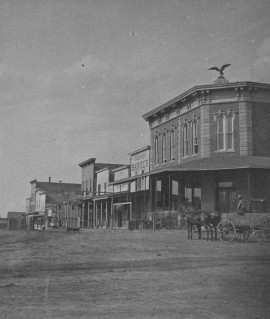Which came first?
Did you know that Abilene, Texas, was named after Abilene, Kansas?
The vibrant history of Abilene traces back to the days of pioneering cattle ranching when vast herds of longhorns embarked on overland journeys from Texas to reach Abilene, the western terminus of Kansas' inaugural railroad. Within the chronicles of the Old West, the city of Abilene claims a rich and colorful standing. Many of the tales and customs that define the era of cowboys originate from the Abilene of nearly a century ago. Unlike numerous fledgling boom towns of that era, Abilene retained its renown and distinctive character.
The narrative of Abilene's origins commenced in 1858 when Timothy F. Hersey and his family selected a plot on the city's present site to establish their log cabin. Mrs. Hersey bestowed the name upon the town rather serendipitously, allowing a book to fall open to the third chapter of Luke, where the term "Abilene," signifying "City of the Plains," appeared in the first verse. Progress in the city was gradual until the completion of the Kansas Pacific Railroad through Abilene in 1867. Recognizing the possibilities presented by the railroad in terms of transporting Texan cattle to eastern markets, a livestock trader from Illinois named Joseph G. McCoy arrived in Abilene with a vision. He aimed to transform the town into a hub for cattle shipments, and to that end, he constructed a stockyard and a hotel. This venture flourished until 1872 when newer railway routes elevated Newton, Wichita, and Ellsworth to more favored positions for shipping.
As the final stop along the Texas cattle trail, specifically the Chisholm Trail, Abilene rapidly transformed into a boisterous and lawless frontier settlement. The landscape was soon dotted with stores, saloons, and gambling establishments, all vying for the attention of cowboys. The prosperity brought by the cattlemen also ushered in a period of unruliness. Tom Smith, renowned for his courage, assumed the mantle of the first city marshal. His initial official decrees prohibited firearms within city limits without a permit. Smith's reputation commanded enough respect that even the most obstinate cowboys and gamblers acquiesced. Tragically, in 1870, Smith lost his life while attempting to apprehend a man near the town of Detroit.
Wild Bill Hickok succeeded Tom Smith as the city marshal, his reputation preceding him even before he arrived in Abilene. His exceptional marksmanship and unyielding commitment to maintaining order and tranquility throughout 1871 enhanced his renown. Whether as a Union Scout during the Civil War, a frontier guide, a duelist, a marshal, or a gambler, his extensive record of dispatching adversaries with either bullets or knives ensured a wide berth from the townsfolk. Wild Bill earned recognition as the preeminent dual-pistol marksman, capable of simultaneously accurately shooting with either hand or both.
Wild Bill held court in the opulent Alamo Saloon, a palace of sorts in Abilene. His appointment as marshal by the town trustees stemmed from his adept courage. He fulfilled this role for eight months in 1871, utilizing the fear of his twin pistols to deter murder and property damage. This was especially commendable due to the burgeoning cattle trade. He primarily occupied his time in the lively and vibrant Texas Street, the town's focal point for revelry, not particularly associating with either the respectable citizens (who shunned the Alamo) or the inebriated cowboys (who, without his presence, might have often met unfortunate fates within the saloons). He was a solitary figure, unafraid of confrontation. Upon assuming office, he stopped gunplay and told the rogue cowboys that he meant business – the rule of law would be upheld. However, he refrained from entirely reforming the town, perhaps concerned that such action could spiral into uncontrollable circumstances.
In Wild Bill's absence, the townsfolk feared anarchy and chaos. However, with his presence, they navigated their daily routines with composure and safety. Hickok departed in the following winter, and the subsequent year saw Abilene's natural calming as the railroad extended its reach to towns farther south. Gratefully, the community evolved into a tranquil, orderly, and law-abiding township.

